By Mary Fairchild
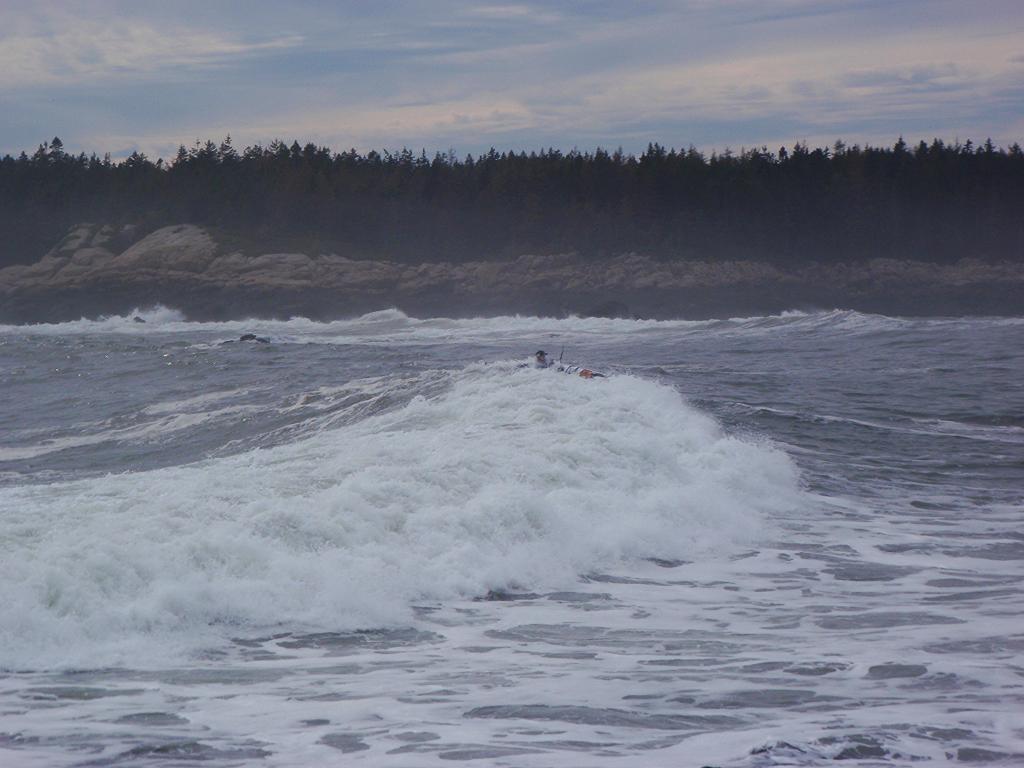 This was my favorite play area from my 2011 guided Coastal Maine trip (2011 report).
This was my favorite play area from my 2011 guided Coastal Maine trip (2011 report).
The sea kayaking community needs, perhaps most of all, to guard against any shift from safety to one of recognition and getting paid.
Known as “Ocean Camp Maine,” my second guided trip to Maine, September 2013, was set up quite differently than I had experienced a few years prior. After the first night’s dinner, Ryan Rushton (head coach) and Haris Subacius (co-leader) had each of us come into the dining room to share our goals for the week privately. As a commercial guest, it is important to know that your guides know what they are doing. I had asked if the Maine guide had arrived. Rushton said we didn’t have one.
On November 4th, 2013, American Canoe Association (ACA) members Christopher Stec (Chief Operating Officer), Kelsey Bracewell (Safety, Education, Instruction, & Outreach)and Wade Blackwood (Executive Director), moved forward with my information “that our group that was illegally led in Maine and that we had also experienced an incident.” Oddly enough, just one month later, December 1st, 2013, an ACA Level 5: Advanced Open Water Coastal Kayaking Instructor Certification Workshop (IDW/ICE) and Update was promoted and was set up to include Ryan Rushton. The $850.00 course promoted ACA Coastal Kayak Committee member Ryan Rushton as the “Registered Maine guide” for this event even though he never became a Registered Maine Guide. The American Canoe Association posted and promoted “Registered Maine Guide Ryan Rushton,” on their website for almost two years.
Update: Eugene Buchanan writes in Paddling.net, July 1, 2019, that American Canoe Association’s Wade Blackwood resigns just four months after the departure of Chris Stec.
The risks in nonprofits, especially ones where everyone works hard and knows and likes each other, is that small lapses will lead to larger ones until the damage cannot be ignored or contained. The real focus needs to be on doing the right thing. In the public’s mind, and in the law books, the nonprofit’s board of directors is responsible for all the assets of the group—including its reputation in the community.
It is my understanding that Maine instituted licensing in response to a rise in incidents. The state of Maine requires that all paid guides be licensed. The Maine Association of Sea Kayak Guides and Instructors (MASKGI) is a non-profit organization of sea kayak outfitters, guides and instructors. Membership is open to all sea kayak guides and instructors or businesses employing sea kayak guides and instructors operating in Maine. “Guide” means any person who receives any form of remuneration for his services in accompanying or assisting any person in the fields, forests or on the waters or ice within the jurisdiction of the State while hunting, fishing, trapping, boating, snowmobiling or camping at a primitive camping area (Maine Professional Guides Association). All members must sign and abide by the Code of Ethics and operating guidelines published by the MASKGI.
During the Ocean Camp Maine trip, several students, including the co-leader, were new to the rocky coastal environment of Maine. If you have never paddled a rocky coastline you are a new student to that environment regardless of your skill level as a sea kayaker. Without much experience at sea, it can be very hard to judge the sea state and conditions. One student, new to the environment, was surfed head-first into a rockface cracking the top of her helmet after being pushed off by the lead guide Ryan Rushton.
Rushton is an American Canoe Association(ACA) Coastal Kayak Committee member. He has a “registered guide status” on the International Sea Kayak Guide Association (I.S.K.G.A) which was founded by Jeff Allen in 2013. A Registered Guide at I.S.K.G.A means that, for a fee, Rushton is using the website for advertising purposes only.
Rushton told me that Tom Bergh might be our registered Maine guide as he had been in 2010 for Rushton’s first coastal Maine trip and I was glad we would have him to guide our group. I met Tom Bergh, of Maine Island Kayak Company (MIKCo), just after that first trip(Trip report here.), at the Sea Kayak Georgia Symposia where I took my first surf class. It was during my Tybee Island surf class that I first became aware of the fact that many whitewater kayakers can really struggle to understand ocean surf: “Many of the students in my class had whitewater backgrounds and were unfamiliar with the surf.” (Tybee Island Sea Kayak Surfing)
On September 23, 2013, I emailed Kelsey Bracewell at the American Canoe Association after consulting with Bonnie Perry. Bonnie Perry invited me to share my Baja incident report during the Ladies of the Lake Sea Kayak Symposium. On the last day of our 7-day kayak expedition two of us made the crossing and the other four had to Mayday in the building gale force wind and building 3 meter seas. By reading incident reports we can become more aware and hopefully avoid the same mistakes.
On November 15th, Christopher Stec attended the MASKGI(Maine Association of Sea Kayak Guides and Instructors) fall meeting. The ACA would be collaborating with the Maine Association of Sea Kayak Guides and Instructors (MASKGI) to offer ACA training and awards.
The MASKGI 2012 winter meeting notes read: “…The ACA … had been collaborating with the Maine Association of Sea Kayak Guides and Instructors (MASKGI) in an attempt to “offer ACA training and awards”(MASKGI Spring 2012 Meeting). Past MASKGI president, Marc Bourgoin, had provided an overview of the proposal for MASKGI to participate in an ACA L4 Open Water Trip Leader/Guide Pilot Program….discussed… at the Fall, 2011 MASKGI meeting. The three instructors… would teach the course…and a third instructor(who was not revealed at that time). … it not only offered great educational opportunities for MASKGI members, but it would be a potential revenue-generating activity as well (MASKGI Winter 2012 Meeting).”
On January 10th, 2014, I inquired with the Maine Marine Patrol about Rushton being called a Registered Maine Guide. I had emailed Chris Stec and Kelsey Bracewell on the 8th letting them know that I had noticed that their ACA website had been calling him a Registered Maine guide.
February 20th, 2014, the ACA Coastal Kayak Committee meeting included, Kelsey Bracewell and Ryan Rushton who had been allowed to remain working on “trip leader awards” even after illegally guiding in September: “Ryan Rushton reported to the CKC that his committee, which had been formed to look at the implementation of the L4 and L5 Trip Leader awards. Ryan stated that the subcommittee transitioned from the implementation of the awards to “is there a market for ‘Guide Certification’”? It was the recommendation of the subcommittee to table both the L4 and L5 Trip Leader award proposals, with an eye toward exploring these as ‘Guide Certifications’.” (02202014_Meeting_Minutes+Final)
John Lull, author of Sea Kayaking Safety & Rescue, posts on the Tsunami Ranger’s blog, “I spent a lot of years working with the ACA and helping structure the earlier(more ‘old school’) instructional Coastal Kayak program which was primarily based on teaching people good kayaking skills and safety. The whole idea…was to address the huge influx of new paddlers , providing enough instruction to allow paddlers to get out on the water with at least a basic understanding of safety and enough technique to survive long enough to learn more–“badges”, “levels”, “awards,” “prizes,” etc. had nothing to do with it. That came later and I fought tooth and nail against it…”L1, L2,…L5 (where’s its end, and what does it mean?) system. It’s all way too complex and relatively meaningless because you can’t really evaluate everyone by slotting them into a given ‘level.’ I won’t judge a paddler’s ability based on a badge they received.”(13)
The sea kayaking community needs, perhaps most of all, to guard against any shift from safety to one of recognition and getting paid. The American Canoe Association (ACA) is a large, pervasive organization. It is a member-based nonprofit organization that reserves the right to revoke or suspend a certification for cause when an Instructor/Instructor Trainer/Instructor Trainer Educator’s conduct has the potential to be detrimental to the Association or its reputation. Any illegal action which occurs during the course of the performance of ACA instructional duties will be considered sufficient cause for revocation of all certifications. Safety Education and Instruction Council Policy Manuel—Section “D”
 Email, 9/23/13, to American Canoe Association’s Kelsey Bracewell(Safety, Education, Instruction & Outreach[SEIC]).
Email, 9/23/13, to American Canoe Association’s Kelsey Bracewell(Safety, Education, Instruction & Outreach[SEIC]).
 Email, 11/04/13; American Canoe Association (ACA) members Christopher Stec (Chief Operating Officer), Kelsey Bracewell (SEIC) and Wade Blackwood (Executive Director).
Email, 11/04/13; American Canoe Association (ACA) members Christopher Stec (Chief Operating Officer), Kelsey Bracewell (SEIC) and Wade Blackwood (Executive Director).
 December 1st, 2013, the ACA Level 5: Advanced Open Water Coastal Kayaking Instructor Certification Workshop (IDW/ICE) and Update was promoted and was set up to include Ryan Rushton. (click on images to read)
December 1st, 2013, the ACA Level 5: Advanced Open Water Coastal Kayaking Instructor Certification Workshop (IDW/ICE) and Update was promoted and was set up to include Ryan Rushton. (click on images to read)
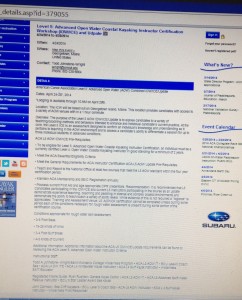 Level 5: Advanced Open Water Coastal Kayaking Instructor Certification Workshop (IDW/ICE) and Update; Registered Maine Guide Ryan Rushton-Geneva Kayak Center-ACA L5 AOW IT (second from bottom). ACA Coastal Kayak Committee member Ryan Rushton is the “Registered Maine guide” for this event even though he never became a Registered Maine Guide.
Level 5: Advanced Open Water Coastal Kayaking Instructor Certification Workshop (IDW/ICE) and Update; Registered Maine Guide Ryan Rushton-Geneva Kayak Center-ACA L5 AOW IT (second from bottom). ACA Coastal Kayak Committee member Ryan Rushton is the “Registered Maine guide” for this event even though he never became a Registered Maine Guide.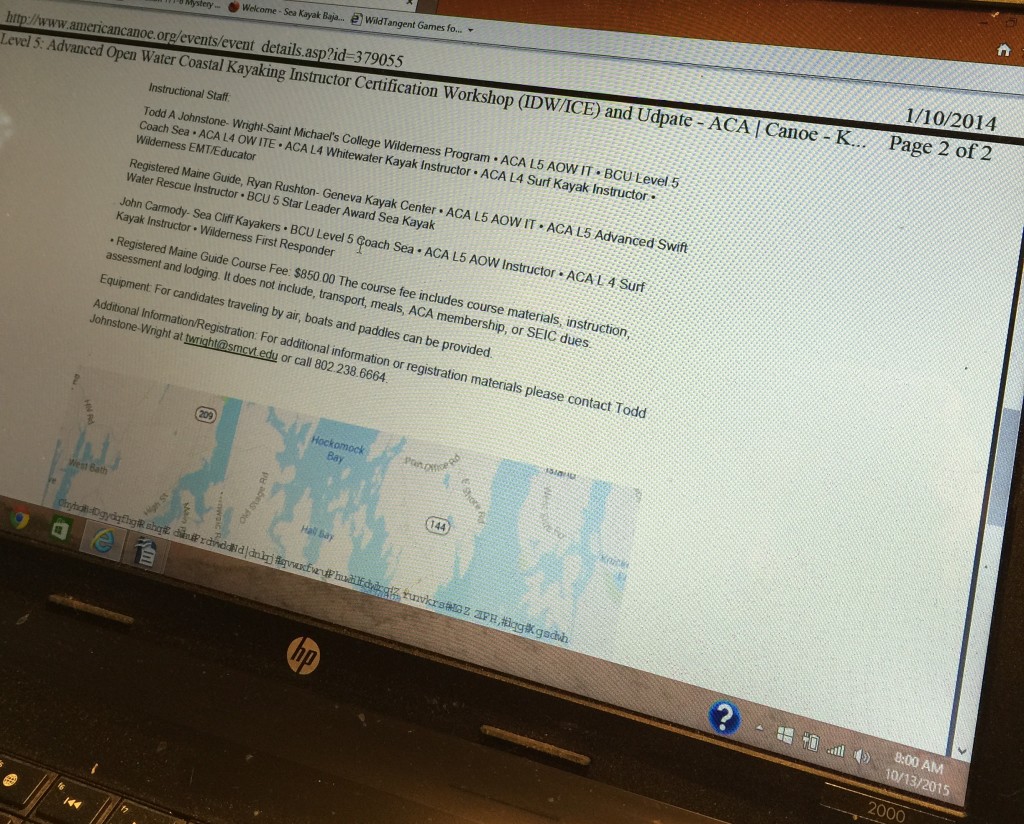 The American Canoe Association posted “Registered Maine Guide Ryan Rushton,” on their website for almost two years; 10/13/2015 date–bottom left corner. (Update: This November, the ACA has finally removed Ryan Rushton’s name as the Registered Maine Guide from the page; 11/17/15).
The American Canoe Association posted “Registered Maine Guide Ryan Rushton,” on their website for almost two years; 10/13/2015 date–bottom left corner. (Update: This November, the ACA has finally removed Ryan Rushton’s name as the Registered Maine Guide from the page; 11/17/15).
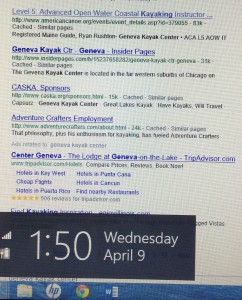
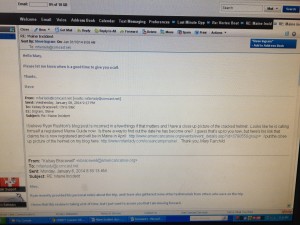 My 1/10/14 email to the Maine Marine Patrol and Chris Stec and Kelsey Bracewell about Ryan Rushton suddenly being called a Registered Maine Guide.
My 1/10/14 email to the Maine Marine Patrol and Chris Stec and Kelsey Bracewell about Ryan Rushton suddenly being called a Registered Maine Guide.
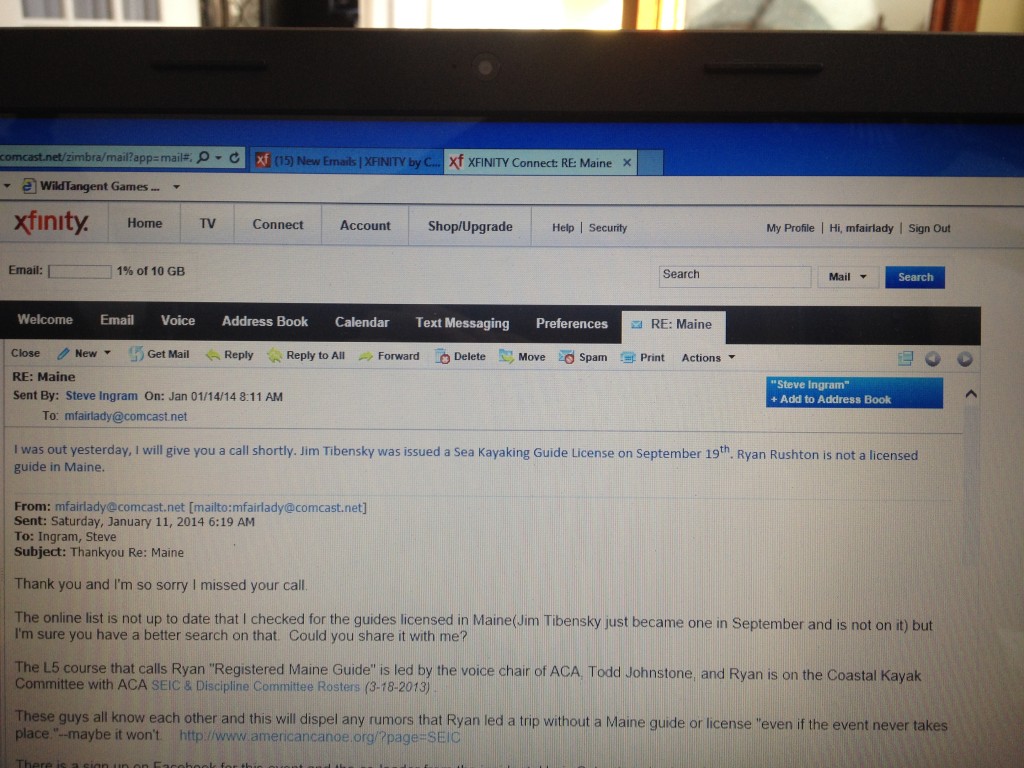 Jim Tibensky was issued a license on September 15th. Ryan Rushton is not a licensed guide in Maine–Maine Marine Patrol.
Jim Tibensky was issued a license on September 15th. Ryan Rushton is not a licensed guide in Maine–Maine Marine Patrol.
Jim Tibensky shared on the Chicago Area Sea Kayakers Blog, “This September past I went to Maine, took the Maine Guide test, passed it, and planned a nice long kayak tour of Casco Bay.” Although he may never mention it, Jim Tibensky was named the “Paddler of the year in 2007″ by the Illinois Paddling Council. Between 1968-1994 Jim won seven state championships, twenty-five Midwest division championships and eight national championships. He was the course designer for two World Cup races, three Champion International Slalom Series, and two National Championship races. In 1996 he officiated as a Scribe at the Atlanta Olympic Games. Tibensky has also led trips to Greenland, the Queen Charlotte Islands, Georgian Bay, the Everglades, Casco Bay Maine, Matagorda Island Texas, Tybee Island, Cumberland Island, Lake Powell and Glacier Bay Alaska. He has participated on two more expeditions to Greenland, one to Glacier Bay, and four trips down the Colorado in the Grand Canyon as well as rivers in Costa Rica and Canada. Since 1998, he has been the head kayak guide for week long sea kayak trips offered through Omni Youth Services of Illinois, a wilderness therapy program that serves the youth and families of Chicago’s Northwest suburbs. (11; Tibensky)
The ACA Board of Directors is comprised of people with a wide variety of skills, ranging from environmental scientists to legal experts to volunteers. Kelsey Bracwell and Christopher Stec are whitewater paddlers(river) and Wade Blackwood was a whitewater rafter with a “finance background.”
Crunching numbers in order to survive, Wade Blackwood did not initially share why the new location for the American Canoe Association had recently delayed its opening. “The executive director, Wade Blackwood, said that the delay in sharing the news of the new location for the past few years had been due to the economic slump. Blackwood says the ACA’s focus in recent months has been “to position ourselves to survive” until the economy improves. “These are challenging times for nonprofit organizations and we are excited to have someone with such a strong financial background as Wade Blackwood step in as the Executive Director. Wade and the ACA team are eager to continue the 130 year ACA tradition of making the world a better place to paddle.” —Former Board President, Dr. Kirk Havens
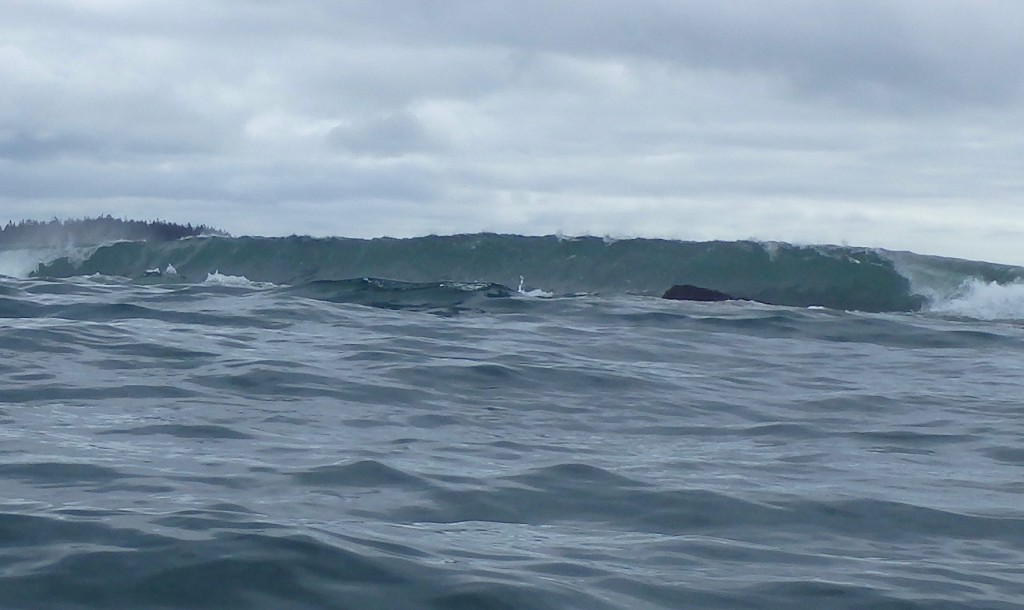 Dumping surf at ledges near Sea Duck Rock location that was meant to de-boat us for practice in 2013 for Ocean Camp Maine.
Dumping surf at ledges near Sea Duck Rock location that was meant to de-boat us for practice in 2013 for Ocean Camp Maine.
Skills alone are not a true measure of a paddler’s competence on the water. John Dowd, founding editor of Sea Kayaking Magazine, author of Sea Kayaking: A Manual for Long Distance Touring and a major advocate of kayaking education and safety believes the keys to the healthy survival of the sport are education through experience and the sharing of information. In the article, John Dowd: Life on the Learning Curve, Dowd imparts, “If you think you are an expert, you’ve got an attitude problem.” While sea kayakers can achieve a degree of competence through the acquisition of skills, he believes attitude and judgment are the real keys to safe paddling. Although both can be taught, they are much harder to assess. (14; Dowd)
“Sea kayaking as I know it is roughly 80 percent seamanship skills (weather, assessment, navigation, knowledge of oceanography, reading of tides and currents, group assessment, coastal survival techniques, etc.) and less than 20 percent boat handling skills(turning, going straight, rolls, rescues, etc.).” John Dowd (14)
The plunging waves that we were set up in the picture above are the “bad boys” which occur most often on reefs. The wave stands up, trips over its own feet and falls forward as solid water. If it falls more than a meter it can blow you out of your kayak. If you launch too soon and get in front of the wave you could nose right into the seaward wall of the reef and that would be the end of your ride (and the bow of your boat). Also resulting from taking the wave too soon, is making it onto the reef only to get banged across the exposed rocks where the wave has yet to reach, resulting in considerable damage to the hull of your boat, or if you tip over, to your head, shoulders and torso.
 Haris Subacius(co-leader): “To get rescues we needed to create rescue situations. To get rescue situations we needed a high impact area. So we found a reef…with two rocks on each side. 9/14/2013.
Haris Subacius(co-leader): “To get rescues we needed to create rescue situations. To get rescue situations we needed a high impact area. So we found a reef…with two rocks on each side. 9/14/2013.
The waves were steep and when Haris did an unexpected pirouette he tried to patrol over that area, but soon Mark was ejected in the steep surf and shoved right toward Haris. It is important to know that when steep waves close out, and you get stuck sideways in there, you don’t want to have serious features to contend with. Underwater pinnacles and reefs create a maze of different depths in rock gardens.
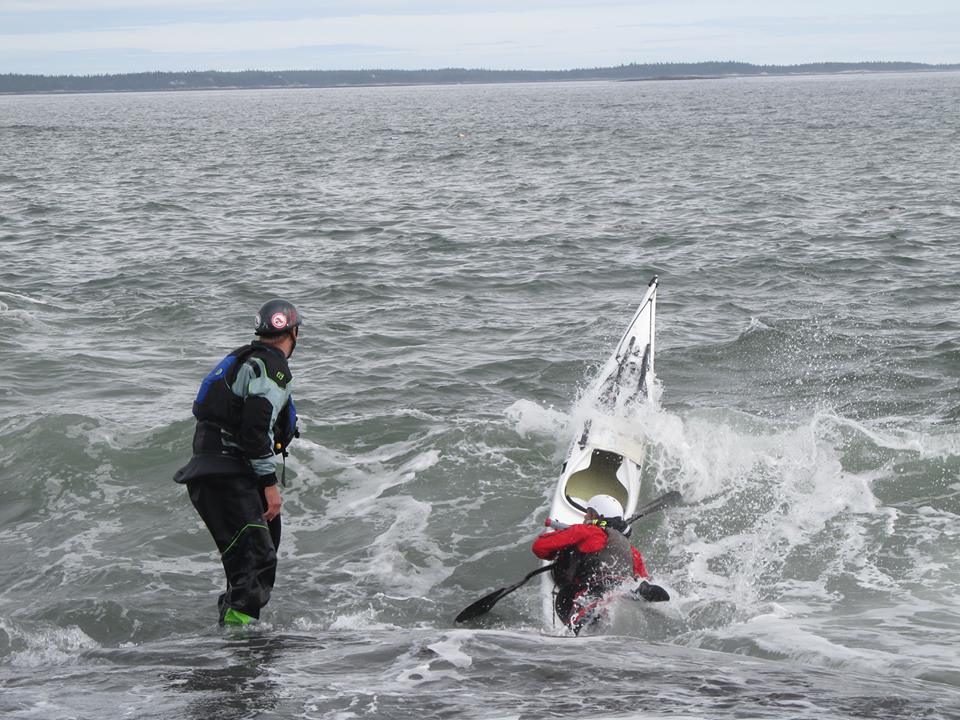 Ryan Rushton pushes Mark Anderson off the Island where the incident would soon occur.
Ryan Rushton pushes Mark Anderson off the Island where the incident would soon occur.
You can see the drop off in this picture where the water becomes deep quickly. Where waves enter a squeezed area and the water is relatively deep, they surge instead of break. A surge can be very powerful when forced through tight passageways in rock gardens. Some surging waves alternate with dumping waves; the smaller waves surge and the larger break. In ocean rock gardens you are usually swimming with your kayak to a safe place where you can reenter the boat.
Although most of the group did not witness the incident, I was able to photograph the incident within this slideshow. After being pushed off by Ryan, Sarah was spun round and surfed toward the cliff head first, back, then into the cliff and then rammed between her boat and the cliff about 5 times as the surf came in with a vengeance. Her helmet was cracked down the top. When she managed to float out from under her boat she was then slammed down by a huge tube. Later she told me she did swallow a lot of water. I was glad she remained conscious. Being knocked briefly unconscious on land may not be that big a deal, but in a kayak in the ocean, swirling around upside-down in a rock garden, it’s likely the end of your story.
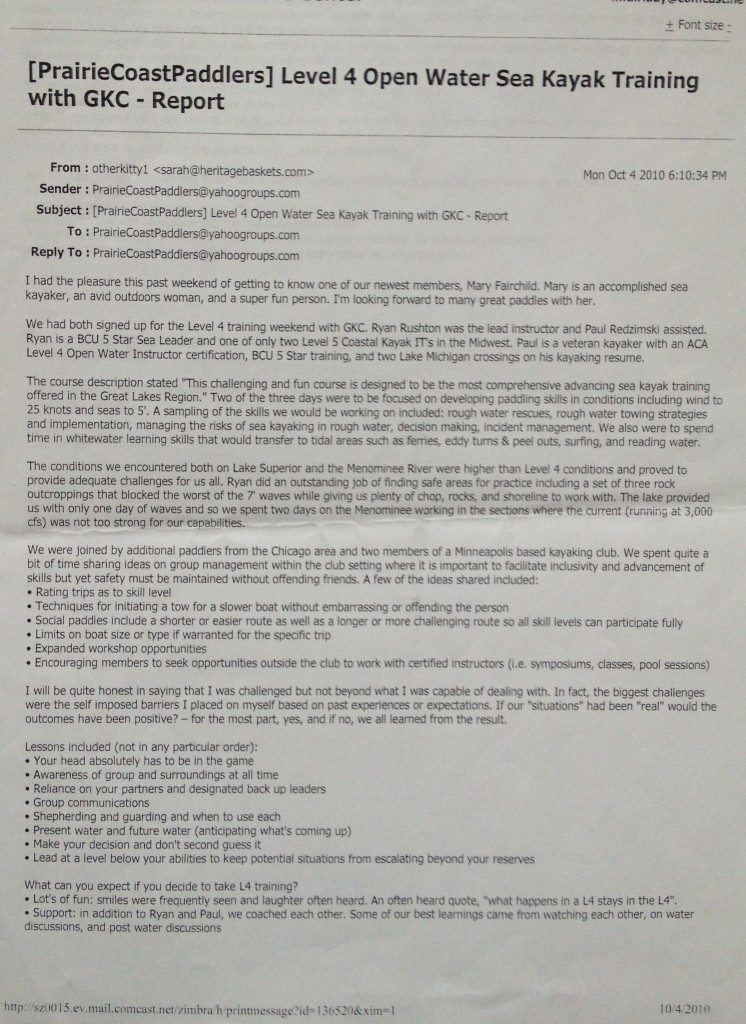 Since 2010, Sarah Hartman and I have had several rough water training courses together. (Level 4 training post; Tybee Island Sea Kayak Surfing; Surfing My First Hole at Piers Gorge; Ocean Camp Maine). As I drove out to Maine with Sarah Hartman she shared with me that she still struggled in surf. She planned to take a “beginners rock gardening class” at the Bay of Fundy Symposium which most of our group would attend immediately following our time in Jonesport, Maine. She said that her advanced trips, like Alaska, did not have much for conditions and after a club trip that included training in Tybee Island with Chris Lockyer earlier in the year, Lockyer had expressed concern.
Since 2010, Sarah Hartman and I have had several rough water training courses together. (Level 4 training post; Tybee Island Sea Kayak Surfing; Surfing My First Hole at Piers Gorge; Ocean Camp Maine). As I drove out to Maine with Sarah Hartman she shared with me that she still struggled in surf. She planned to take a “beginners rock gardening class” at the Bay of Fundy Symposium which most of our group would attend immediately following our time in Jonesport, Maine. She said that her advanced trips, like Alaska, did not have much for conditions and after a club trip that included training in Tybee Island with Chris Lockyer earlier in the year, Lockyer had expressed concern.
“At first glance the whitewater in ocean rock gardens looks very similar to a whitewater river. You’ll see waves, aerated rough water, rocks, currents, and swirling chaotic conditions. They share some characteristics, but are actually very different environments.” John Lull (9)
Sea kayakers are being told that it is good practice for the coast if they paddle whitewater rivers, but there are some extreme differences.
“In river running, a pour-over is a river current that flows over a rocky ledge into a hole below. In ocean adventure kayaking, a pour-over is a flat rock or a reef which a wave surges over into calmer water on the shoreward side. River pour-overs are predictable; that is, what you see when you scout is what you get, as the water flow is constant. Ocean pour-overs are less predictable and thus more dangerous, since the waves pulse in a dynamic rhythm….” Eric Soares (8)
In a river the waves are stationary and the water is moving through it as a current, whereas in the ocean, the wave form is moving through the water and the water is moving up and down in a circle as the wave passes through. When you surf a wave in the river, you’ll be standing still.
“The statistics related to whitewater injuries are unreliable, but we do know that among the fatal cases, the mechanism of death tends to be a combination of impact to the head and drowning. The whitewater industry and the people who enjoy these sports need to begin talking about standards for a helmet that could do a better job of preventing such injuries.” Headlines @ Hopkins
 Sarah Hartman, Mary Fairchild, Mark Anderson, Matt March , and Joe Keller at the guest house. Picture by Peggy Oneal.
Sarah Hartman, Mary Fairchild, Mark Anderson, Matt March , and Joe Keller at the guest house. Picture by Peggy Oneal.
The sun came out and Sarah held ice bags on her face. Boat repairs were part and parcel on this trip of mostly employees. When Haris, the co-leader, put Sarah’s cracked helmet in a few pictures it occurred to me–just like a skier with their arm in a cast looks like a risk taker, broken boats and gear can make you look “hardcore.”
“Perhaps it is because I come from the old school of kayaking when the idea was to miss the rocks but I have been a little alarmed at the antics of some ‘new age’ boaters who seem to think that stuffing your boat on the rocks is all part of the fun. … if you attempt a pour-over and end up stuck on a rock, you’ve screwed up.” Sean Morley (15)
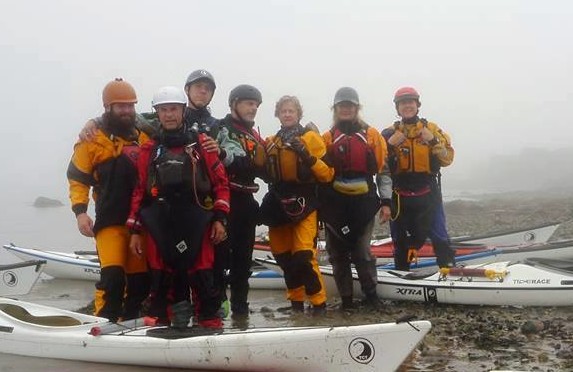 Ocean Camp Maine 9/14/2013; Geneva Kayak Center staff Matt March, Mark Anderson, Ryan Rushton (lead guide/owner), Joe Keller, Sara Hartman (owner), and repeat clients Mary Fairchild and Peggy Oneal; Jonesport, Maine.
Ocean Camp Maine 9/14/2013; Geneva Kayak Center staff Matt March, Mark Anderson, Ryan Rushton (lead guide/owner), Joe Keller, Sara Hartman (owner), and repeat clients Mary Fairchild and Peggy Oneal; Jonesport, Maine.
Rushton posted his reports on his Geneva Kayak Center company website:
“Certification’s principle function, so far as I can tell, is to generate cash for rapacious bureaucracies…and our favorite pastime shifts from a freedom activity to one of membership in an exclusive club administered by a hierarchy of bureaucrats with an inflated sense of their own importance and competence.” John Dowd (13)
John Dowd is concerned about trends in certifying guides and instructors and he believes that a misplaced confidence frequently develops among those who have been certified to teach or guide, since curriculum content often replaces real experience. Yet even with familiarity, complacency can cause us to understate the present danger and miss things that would have otherwise caught our attention when we were less familiar with the area.
Experienced guides who chose to launch two separate raft trips on the Illinois River in central Oregon elected to run a stretch of the river that includes a Class V section called the Green Wall that can only be run between 900 and 3000 cfs. The guides choose to put in at 13,500 cfs and two people died–both were river guides with a lot of experience. A paddler who was less familiar with the river and chose to stay on shore commented, “When the river has been coming up a foot an hour all night, when its gone from clear to chocolate milk, when there are no more eddies and there are 18″ diameter trees going down at 15mph, its just not a tough decision.” He saw something the guides missed. Laurence Gonzales, in his book “Deep Survival: Who Lives and Who Dies and Why, concludes that the mindset of the guides fatal decision was, “they probably thought, if they thought at all, that it would be okay. They had a lot of experience at running the river, and it had always been okay. Big water, said their emotional systems, equals big fun.” (4; Gonzales)
Liability waivers don’t prevent people from seeking relief when their guides have behaved with gross negligence, which the law defines as “willful and wanton” actions that indicate a high degree of recklessness. This is the failure to use ordinary care (failure to notice a frayed climbing harness, etc.). But being wrong is not the same as being careless. In California, a high school swimmer was coached to dive into a shallow end of a pool resulting in paralyzing the swimmer. A $11.5 million lawsuit was awarded from the school district. If you enhance the natural risk of a physical activity, you can be responsible for that.
Related Material and References
- Keyes, Christopher, “Why Risk It?”, Outside Magazine, March 2012, p. 26.
- Fairchild, Mary, Baja Winter Kayak Expedition: Wind, Waves, and Lipstick.
- Gonzales, Laurence, “Deep Survival: Who Lives, Who Dies, and Why,” 2005.
- Ibid., p. 117.
- Ibid., p. 132.
- Lull, John, “Sea Kayaking Safety & Rescue,” Wilderness Press, 2005.
- Dolan, Mora, “Justices Set Limits on Coach Lawsuits,”LA Times; 8/29/03
- Soares, Eric, Paddling Pour-Overs in Ocean Rock Gardens; Tsunami Rangers; 9/19/11.
- Lull, John, “Whitewater River vs Ocean Whitewater.” Tsunami Rangers; 10/24/2011.
- Kayarchy, The Nature of Surf: Spilling or Plunging.
- Tibensky, James and Kneper, Andrea, “A Whole New World: Kayaking as Therapy for Kids, Sea Kayaker Magazine, 4/2011.
- Lancaster, Jeff, “John Dowd: Life on the Learning Curve;” Sea Kayaker Magazine, 2004.
- Tsunami Rangers Blog, “Certification–What’s the Point?“, July 2011.
- Dowd, John, “Sea Kayaking: A Manual for Long Distance Touring”; p. viii.
- Morley, Sean, Oceans of Whitewater (Part 4)-Mastering the Pour-over. Jackson Kayak Blog; 9/4/2014.
- Fairchild, Mary, Geneva Kayak Center and Yorkville: Catching Waves and Whitewater in the Midwest; 1/30/11.
- Buchanan, Eugene, 05/29/1019, Chris Stec Resigns as ACA COO
- Eugene, Buchanan, 07/01/2019, Wade Blackwood Resigns As ACA ED

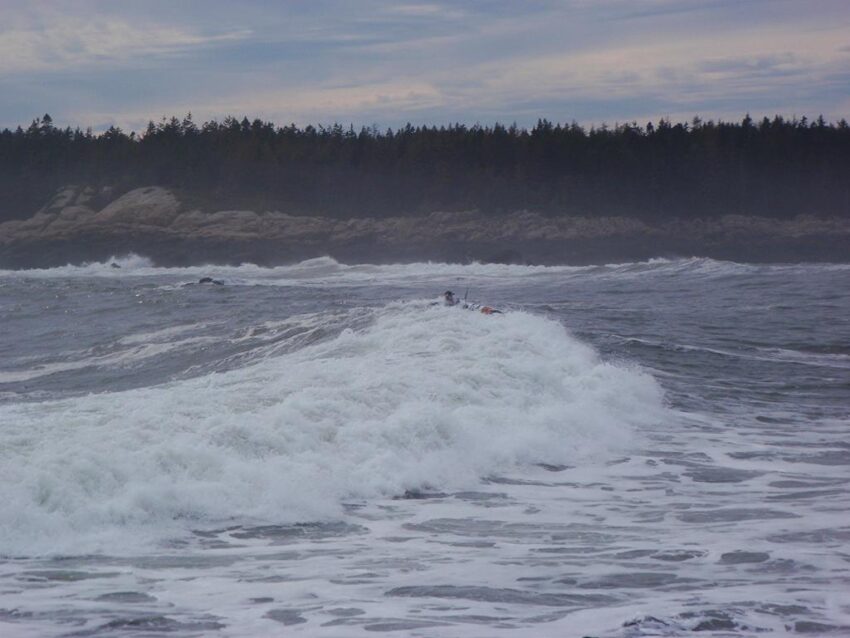
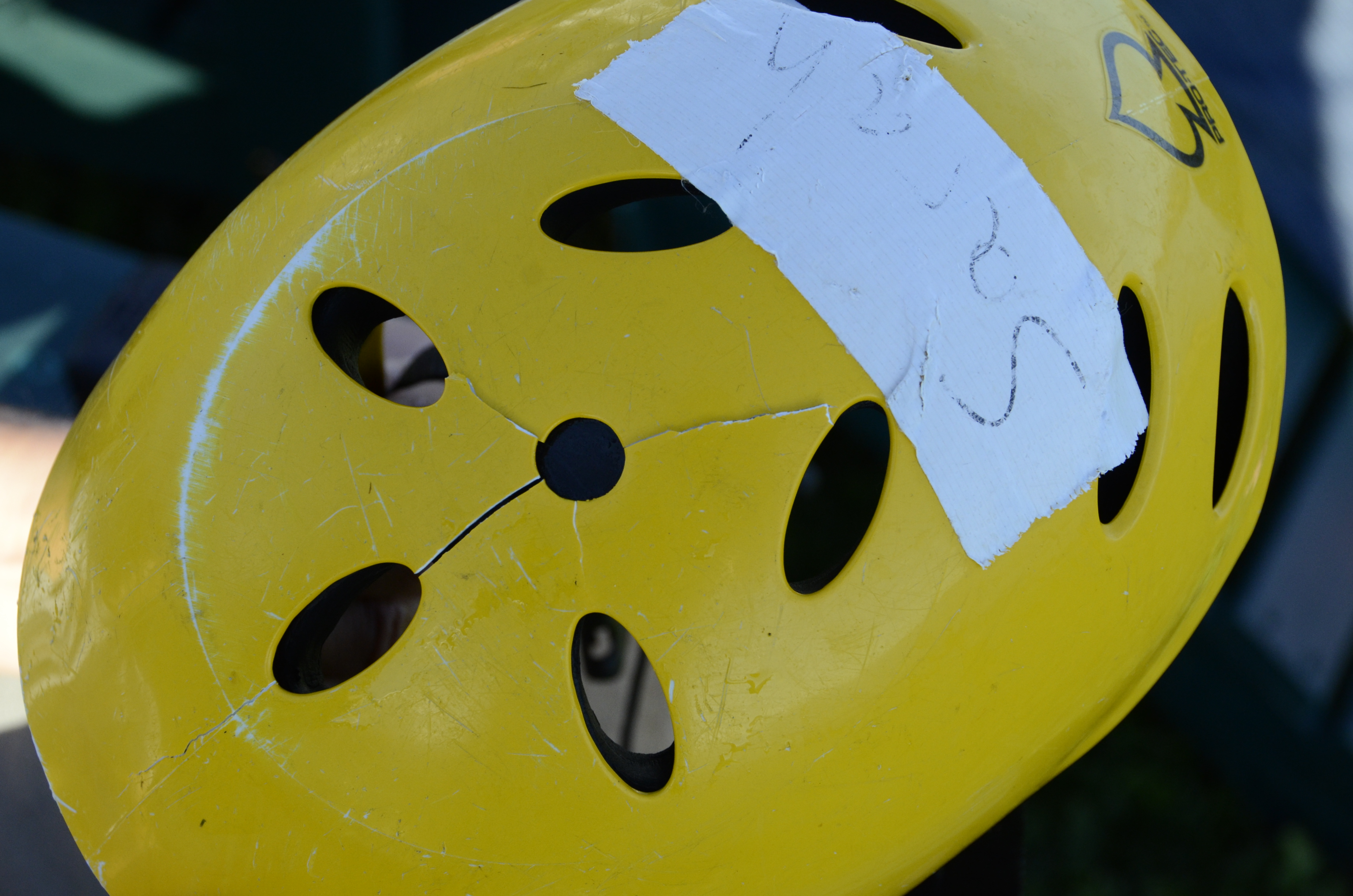
Thank you for the kind mention in you blog; there is a slight correction: the blog “Sea Kayak Safety” is not part of the club Inland Sea Kayakers, but is in fact: mine. “The Awareness, Training, Education and Resource Center for Sea Kayak Safety”
Your experiences outlined here sound rather intense; I would be interested in conclusions you would come up with.
Thank you, Jeff. This Maine trip was very different from the 2011 trip, of which I enjoyed so much. I believe the owner/employee ratio to clients may have played into the way this trip was led and became more intense. Although I played in much larger surf in ’11, it was spilling and less steep and the play areas had less hazards. We also did not have the required Maine Guide as we had on my last trip and Geneva Kayak’s first trip in which Tom Bergh assisted.
Maine is one of the few states that requires their guides to be licensed. The Maine Association of Sea Kayak Guides and Instructors (MASKGI) is a non-profit organization of sea kayak outfitters, guides and instructors. The MASKGI By-Laws states that membership is open to all sea kayak guides and instructors or businesses employing sea kayak guides and instructors operating in Maine. “Guide” means any person who receives any form of remuneration for his services in accompanying or assisting any person in the fields, forests or on the waters or ice within the jurisdiction of the State while hunting, fishing, trapping, boating, snowmobiling or camping at a primitive camping area. All members must sign and abide by the Code of Ethics and operating guidelines published by the MASKGI.